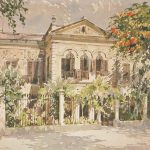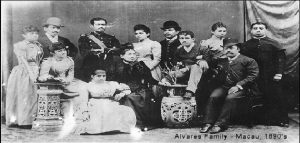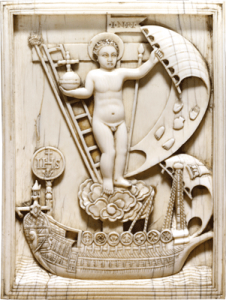Part 2
 In the minds of the current Macanese leadership, the preservation of Macau’s culture boils down to whether certain practices, such as use of the Portuguese language, can be passed down to younger generations. The reduction to these “essentials” suggests that one reason why Macanese leaders appear incapable of coming to any conclusions about identity may be their unwillingness to recognize Macau’s multi-cultural origins. At the same time their attempts to assert Macanese culture, which often emphasizes Portugal’s colonial past, may even isolate them from Macau’s community at large.[1]
In the minds of the current Macanese leadership, the preservation of Macau’s culture boils down to whether certain practices, such as use of the Portuguese language, can be passed down to younger generations. The reduction to these “essentials” suggests that one reason why Macanese leaders appear incapable of coming to any conclusions about identity may be their unwillingness to recognize Macau’s multi-cultural origins. At the same time their attempts to assert Macanese culture, which often emphasizes Portugal’s colonial past, may even isolate them from Macau’s community at large.[1]
In spite of this cultural myopia, public and private cultural practices inside and outside Macau appear with surprising frequency. Even as Macanese leaders decry the drop in Portuguese usage, some encourage use of Macau’s patois, “Maquista”, with varying levels of historical accuracy, through theatrical productions and catch phrases.[2] Macanese cuisine has also become a thriving staple of Macau’s tourism, and is still practiced in many Macanese kitchens around the world. Local and diaspora Macanese, mindful that their culture is eroding, cling to memories of places and times past through e-mail, websites, and social media. [3] Others are involved in genealogical, journalistic, academic, or commercial projects intended to boost involvement. To encourage contact with older Macanese, the Macau government also pays local associations to host tri-annual meetings (Encontros) in Macau, and supports expatriate organizations in several countries.
Intangible Feelings of Family and Community
 While the contrasts are evident, they also appear to originate from the same source. As the importance of cultural touch stones such as language diminish, a unifying factor that binds both public and private domains may be internal: that is, within Macanese families. In many cases, a principal reason why generations of Macanese inside and outside Macau continue to ask “Who am I ?” and “Where do I come from ?” derive from ideas and associations implanted by parents, grandparents, and other close relatives. Often through a mix of language, food, religious traditions, and nostalgia, even as distant memories, questions of identity and origins are raised, ultimately shaping feelings of cultural identification that cannot be reduced to any one element. When that cultural milieu is supported by multiple generations, sometimes living in the same household, even vague ties to Macau’s culture survive over several generations. When the same feelings of identity are shared through marriage to other families, and in marriage across cultures, questions of cultural identity become greater with each succeeding generation.
While the contrasts are evident, they also appear to originate from the same source. As the importance of cultural touch stones such as language diminish, a unifying factor that binds both public and private domains may be internal: that is, within Macanese families. In many cases, a principal reason why generations of Macanese inside and outside Macau continue to ask “Who am I ?” and “Where do I come from ?” derive from ideas and associations implanted by parents, grandparents, and other close relatives. Often through a mix of language, food, religious traditions, and nostalgia, even as distant memories, questions of identity and origins are raised, ultimately shaping feelings of cultural identification that cannot be reduced to any one element. When that cultural milieu is supported by multiple generations, sometimes living in the same household, even vague ties to Macau’s culture survive over several generations. When the same feelings of identity are shared through marriage to other families, and in marriage across cultures, questions of cultural identity become greater with each succeeding generation.
Unfortunately, discussions of identity among Macanese leaders are being conducted without regard to cross-cultural ties, family, or history, serious omissions in light of Macau’s large and relatively young Luso-Asian population who continue to seek answers.[4] The debate continues to focus on the dwindling use of Portuguese among the Macanese in Macau. Exclusion and isolation are not necessarily the leaders’ intention, nor should criticism of their methods invalidate attempts to preserve Macanese culture. However, the inward focus of Macanese leaders without aligning with the greater needs of Macau society may actually work at cross purposes to their goals. For their isolation may be marginalizing them in the eyes of the local community, and may even trivialize their declarations as self-interested lobbying. The limited nature of their debates also suggests an inability to see Macau as a culturally unique and economically diverse city, concepts that are essential to understanding its history.
The Uniqueness of Macau’s Culture
 Macau’s place in history is well known outside China. Historians and cultural anthropologists for over a century have written about Macau’s unique past, marked by the migration of different ethnic groups that supported the city’s rise as a principal trading port since the middle of the sixteenth century.[5] Many studies suggest that Macau’s survival is based on a tradition of ethnic inclusion brought about by wide ranging trade with many countries. After the 1999 handover, Macau’s uniqueness became a feature of the local tourist industry, and since UNESCO’s 2005 declaration, an emphasis on the city’s cultural heritage has become a popular topic of academic research.[6]As a result, a long history of diversity stemming from various cultural contacts has led to different types of commercial enterprises. Macau’s tendency toward economic and cultural diversification, however, has been recently stunted by the growth of casino gaming, creating a dependency for employment, government taxes, and social programs.
Macau’s place in history is well known outside China. Historians and cultural anthropologists for over a century have written about Macau’s unique past, marked by the migration of different ethnic groups that supported the city’s rise as a principal trading port since the middle of the sixteenth century.[5] Many studies suggest that Macau’s survival is based on a tradition of ethnic inclusion brought about by wide ranging trade with many countries. After the 1999 handover, Macau’s uniqueness became a feature of the local tourist industry, and since UNESCO’s 2005 declaration, an emphasis on the city’s cultural heritage has become a popular topic of academic research.[6]As a result, a long history of diversity stemming from various cultural contacts has led to different types of commercial enterprises. Macau’s tendency toward economic and cultural diversification, however, has been recently stunted by the growth of casino gaming, creating a dependency for employment, government taxes, and social programs.
Conclusion
We will not dwell on the reasons why the current generation of Macanese leaders choose to emphasize parts of their history and not its entirety. The search for identity, however, should be seen in the context of a larger international effort to preserve Macau’s culture. The key is understanding Macau’s cultural heritage in all its complexities as it involves many different groups, including Chinese, Portuguese, and Macanese, many of whom have relatives living in other countries who have an interest in Macau’s future. [7] As one historian recently observed: “Only by embracing Macau’s past can we start looking to the future with more confidence.” We would add that only with a common understanding of Macau’s historic diversity can we devise a strategy to focus cultural preservation going forward. Moreover, the insistance that use of the Portuguese language defines the smaller “Maquista” community does not address whether they see themselves as part of the larger Macanese society in present day Macau. Only by involving themselves in programs that affect all communities can each of us find lessons for inclusion and Macau’s development in the future.
Notes:
[1] Members of the Macanese community in Macau often identify to themselves as “Maquistas”, a name derived from the local patois, a mix of Portuguese, Cantonese, and some arugue, English, that orginate from the 16th century. A recent example of local interest appeared in an article in Hoje Macau, a Portuguese language newspaper, about the establishment of the Bishopric of Macau. http://hojemacau.com.mo/2016/01/29/ate-a-criacao-da-diocese-de-macau/
[2] The group is called “Dóci Papiaçam di Macau” (Sweet Creole of Macao):http://www.macauhub.com.mo/en/2015/08/21/macanese-patois/
[3] Click HERE for a list of current Macanese organizations.
[4] This program is in contrast to local historians who take the long view on cultural identity in Macau. See the interview with Barnabas Koo: http://hojemacau.com.mo/2016/01/29/barnabas-koo-historiador-apresenta-biografia-sobre-gary-ngai/
[5] For example, see C.A. Montalto de Jesus’ Historic Macau, published in 1902. For recent scholarship, see Mark Meuwese, Brothers in Arms, Partners in Trade: Dutch-Indigenous Alliances in the Atlantic World, 1595-1647, the Netherlands, 2012, p. 129; Stefan Halikowski Smith, “Creolization and diaspora in the Portuguese Indies: the social world of Ayutthaya, 1640-1720”, Leiden, Boston, 2011; and Genevieve Escure and Amir Schwegler, Creoles, Contact and Language Change: Linguistic Interpretations, Philadelphia, 2004, 5-6. See also A. J. R. Russell-Wood, The Portuguese Empire: 1415-1808, Johns Hopkins Press, 1998, James C. Boyajian,Portuguese Trade in Asia under the Hapsburgs, 1580-1640, Johns Hopkins Un. Press, 1993; and George Bryan Sousa, The Survival of Empires: Portuguese Trade and Society in China and the South China Sea 1630-1754, Cambridge Un. Press, 1986. There are also the numerous studies of C.R. Boxer that predate late 20th century research.
[6] UNESCO designated the Historic Centre of Macau as a World Heritage Site in 2005.
[7] We have estimated that the current population of Macau’s descendants is about 1.5 million, most living in 35 countries around the world. Click HERE for more information.